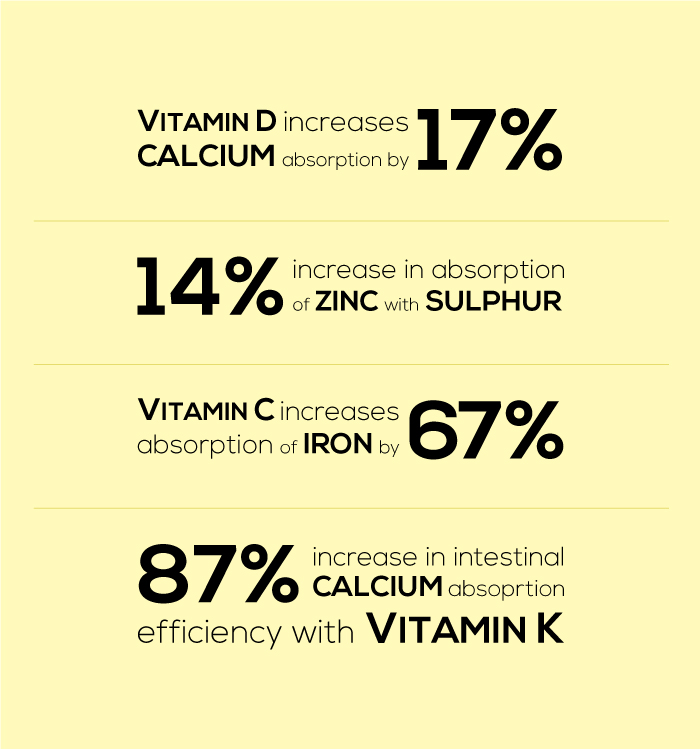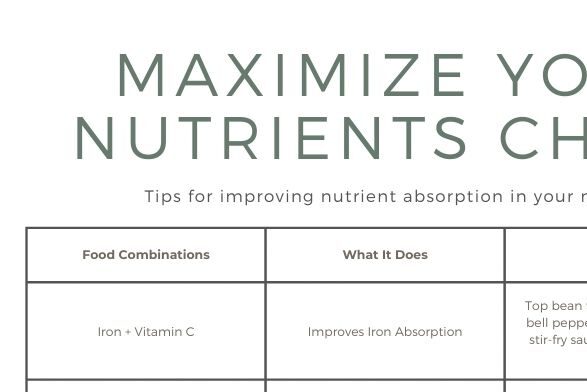Vitamins are essential for our health. They help our bodies function properly. But, just eating vitamins is not enough. We need to make sure our bodies absorb them well. How can we do this? Here are some tips to maximize vitamin absorption.
1. Combine Vitamins with the Right Foods
Some vitamins need certain foods to be absorbed well. For example, fat-soluble vitamins need fats. These vitamins include A, D, E, and K. Eat them with healthy fats like avocados or nuts.
Fat-soluble Vitamins And Healthy Fats
| Vitamin | Healthy Fat |
|---|---|
| Vitamin A | Avocado |
| Vitamin D | Olive oil |
| Vitamin E | Almonds |
| Vitamin K | Walnuts |

Credit: www.truebasics.com
2. Take Water-Soluble Vitamins with Water
Water-soluble vitamins dissolve in water. These vitamins include C and B complex. Drink a glass of water when you take them. This helps your body absorb them better.
Examples Of Water-soluble Vitamins
- Vitamin C
- Vitamin B1 (Thiamine)
- Vitamin B2 (Riboflavin)
- Vitamin B3 (Niacin)
- Vitamin B5 (Pantothenic Acid)
- Vitamin B6 (Pyridoxine)
- Vitamin B7 (Biotin)
- Vitamin B9 (Folate)
- Vitamin B12 (Cobalamin)
3. Pay Attention to Timing
When you take vitamins matters. Some vitamins are best taken with meals. Others are better on an empty stomach. For example, take fat-soluble vitamins with food. Take iron supplements on an empty stomach.
Best Times To Take Vitamins
| Vitamin | Best Time |
|---|---|
| Vitamin A | With meals |
| Vitamin B12 | Empty stomach |
| Vitamin C | With meals |
| Vitamin D | With meals |
| Iron | Empty stomach |
4. Avoid Certain Foods and Drinks
Some foods and drinks can block vitamin absorption. For example, caffeine and alcohol can interfere. So, avoid them when taking your vitamins. Also, avoid high-fiber foods when taking minerals like iron and calcium.
Foods And Drinks To Avoid
- Coffee
- Tea
- Alcohol
- High-fiber foods
5. Know About Interactions
Some vitamins and minerals affect each other. For example, calcium can block iron absorption. So, don’t take them together. Instead, take them at different times of the day.
Examples Of Vitamin And Mineral Interactions
| Vitamin/Mineral | Interaction |
|---|---|
| Calcium | Blocks iron absorption |
| Vitamin D | Helps calcium absorption |
| Vitamin C | Boosts iron absorption |
6. Keep Your Gut Healthy
A healthy gut helps absorb vitamins better. Eat probiotic foods like yogurt. They keep your gut healthy. Also, eat fiber-rich foods to support good bacteria in your gut.
Probiotic And Fiber-rich Foods
- Yogurt
- Kefir
- Kimchi
- Whole grains
- Fruits
- Vegetables
7. Stay Hydrated
Water is essential for vitamin absorption. Drink enough water every day. This helps your body absorb and transport vitamins.
Tips To Stay Hydrated
- Carry a water bottle
- Drink water with every meal
- Set reminders to drink water
8. Store Vitamins Properly
Store vitamins in a cool, dry place. Heat and light can destroy vitamins. Keep them in their original containers. Also, check expiration dates regularly.
Tips For Storing Vitamins
- Keep in a cool, dry place
- Avoid direct sunlight
- Check expiration dates

Credit: plantbasedrdblog.com
Frequently Asked Questions
What Foods Enhance Vitamin Absorption?
Healthy fats like avocados, nuts, and olive oil improve vitamin absorption.
How Does Hydration Affect Vitamin Absorption?
Proper hydration helps transport vitamins throughout the body.
Does Cooking Affect Vitamin Absorption?
Yes, cooking can reduce or enhance vitamin absorption depending on the method used.
Can Supplements Improve Vitamin Absorption?
Yes, supplements can help, especially if you’re deficient in certain vitamins.
Conclusion
Maximizing vitamin absorption is key for good health. Combine vitamins with the right foods. Pay attention to timing. Avoid certain foods and drinks. Know about interactions. Keep your gut healthy. Stay hydrated. Store vitamins properly.
Follow these tips to ensure your body gets the most from your vitamins. This will help you stay healthy and strong. Remember, a balanced diet is the best way to get your vitamins. Supplements are just that – supplements. They should not replace a healthy diet.











